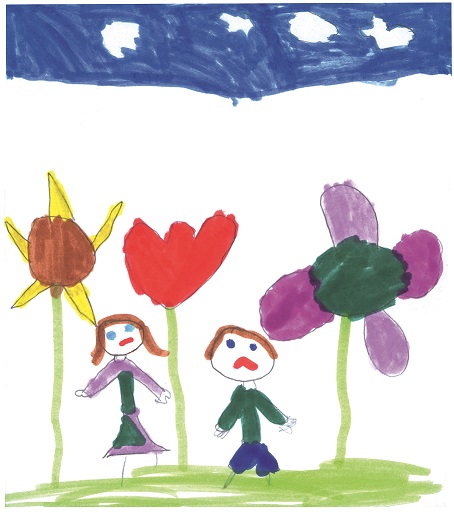Having to Say Hello and Goodbye Too Soon

Early pregnancy loss
When there is an early pregnancy loss, or miscarriage, it may be difficult for you to know what to tell your children. The task may be especially troubling if you have chosen to terminate a pregnancy for medical or other reasons. How do you tell a young child that they will never see the baby they were looking forward to? As described by one grieving parent, “You can’t even explain it to yourself; I don’t know how you can explain it to the children.”
Because it is so hard to find the right thing to say to a young child about a perinatal death, it may be tempting not to say anything at all. Although children may not have known for certain that their mother was pregnant, they most likely sense that something has happened to upset their parents. The best that grieving parents can be expected to do is to present the facts simply and clearly, taking into account the child’s age and experience.
Talking with your children about the infant who has died, even years afterward, can be helpful to parents and children. One mother tells of her son’s reaction to her six miscarriages:
“My son complains sometimes that he is an only child. I tell him that there might have been six others and look at all the fights you’d be having now. We sit down and talk about what their names might have been. He would say, ‘Oh, you wouldn’t call them this or that name.’ It is a good relationship. We’re very open with each other, and I always try to answer his questions.”
A multiple pregnancy loss
When a surviving child, or children, is from a multiple pregnancy, talking about the siblings who are missing can be a delicate task. Children who have survived a multiple birth can benefit greatly from knowing very early on about the circumstances surrounding their birth. In this way, you can help them gain a realistic idea of what might have been and to reassure them of their completeness.
“It is important to make it real and tangible. I say to Layla that she had a twin sister but she’s not here. I show her a photo and tell her that Chloe was in my tummy, too.” (Lyndal)
“Max, who will be three in March, has started talking about his twin, Oliver. He seems to be quite aware and interested when I talk about the two of them – how they were identical and therefore looked the same.” (Rachel)
“I often point to my stomach and explain to Layla: “Your head was up here and Chloe’s was down here and Chloe’s feet were touching your head. Maybe she was giving you a tickle.” (Lyndal)
Neonatal loss
When a baby is stillborn or dies in the days or weeks after birth, it can be very difficult to explain to your child why the baby you gave birth to will not be coming home. Children may be introduced to their new brother or sister through a range of medical equipment from humidicribs to life-support systems. As difficult as it may be, allowing your child to see the baby may help them feel they are the big brother or sister they had hoped to be, and always will be.
“We had to explain to Natasha that Joshua was sick and that the doctors weren’t sure what was wrong with him.” (Natalie C.)
It can also be beneficial for brothers and sisters to see how sick their sibling is and that doctors are trying to do everything possible.
This article was prepared using extracts from What about the Other Kids?1 The full text is available online or contact Red Nose Grief and Loss Services on 1300 308 307 for a printed version.
Last reviewed: 19/9/25
Share
1. Bereaved Parents & SIDS and Kids. (2005). What About the Other Kids? A Booklet by and for Parents of Children whose Brother or Sister has Died (D. Same, Com., M. Bannan, A. Faulkner, J. Foong, S. Foong, J. Frisina, L. Green, R. Green, …& H. Wilson, Illus.). Malvern, Vic.: SIDS and Kids.



